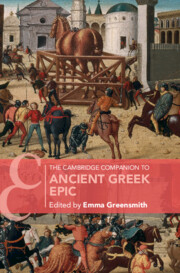Book contents
- The Cambridge Companion to Ancient Greek Epic
- The Cambridge Companion to Ancient Greek Epic
- Copyright page
- Contents
- Figures
- Contributors
- Preface
- Introduction
- Part I Epic Engagements
- Part II Epic Space
- Part III Epic Time
- Part IV Epic People
- Part V Epic Feelings
- Part VI Epic Without End
- 17 Ancient Readers of Greek Epic
- 18 Greek Epic in a Christian Empire
- 19 The Fates of Epic in Byzantium
- 20 Homeric Epic and Nation-Building in Modern Greece and Turkey
- 21 Ancient Greek Epic and the Cinema
- Epilogue
- Timeline of Ancient Greek Epic
- Bibliography
- Index Locorum
- Subject Index
- Cambridge Companions To Literature
21 - Ancient Greek Epic and the Cinema
Transformations and Archetypes
from Part VI - Epic Without End
Published online by Cambridge University Press: 04 December 2024
- The Cambridge Companion to Ancient Greek Epic
- The Cambridge Companion to Ancient Greek Epic
- Copyright page
- Contents
- Figures
- Contributors
- Preface
- Introduction
- Part I Epic Engagements
- Part II Epic Space
- Part III Epic Time
- Part IV Epic People
- Part V Epic Feelings
- Part VI Epic Without End
- 17 Ancient Readers of Greek Epic
- 18 Greek Epic in a Christian Empire
- 19 The Fates of Epic in Byzantium
- 20 Homeric Epic and Nation-Building in Modern Greece and Turkey
- 21 Ancient Greek Epic and the Cinema
- Epilogue
- Timeline of Ancient Greek Epic
- Bibliography
- Index Locorum
- Subject Index
- Cambridge Companions To Literature
Summary
This chapter considers the formations and transformations of Greek epic in the cinema. The cinema has been fundamentally heroic and epic in both subject matter (the mythic past) and elevated visual style since its birth in 1895. Rather than resurvey this prominence of epic themes in the history of film, Winkler demonstrates their power through a reading of the cinema’s own epic genre par excellence – the Western. The chapter first shows how the American Western follows archetypal heroic models in both plot and character and how many films are patterned explicitly on Homeric epic. Winkler then turns to specific archetypal aspects of ancient epic, primarily Homer’s, in the Western. These include fame (kleos); rivalry to be the best (aristos Akhaiôn / fastest on the draw); the heroic code’s implications of doom and death; heroic rituals (arming before duels/showdowns as forms of aristeia); and fundamental story patterns, primarily the development from savagery to civilisation (chaos to kosmos) in the form of ktisis narratives connected with revenge (tisis). Winkler details the power of these archetypes by examining one of the most profound epic-mythic Westerns.
- Type
- Chapter
- Information
- The Cambridge Companion to Ancient Greek Epic , pp. 442 - 459Publisher: Cambridge University PressPrint publication year: 2024

